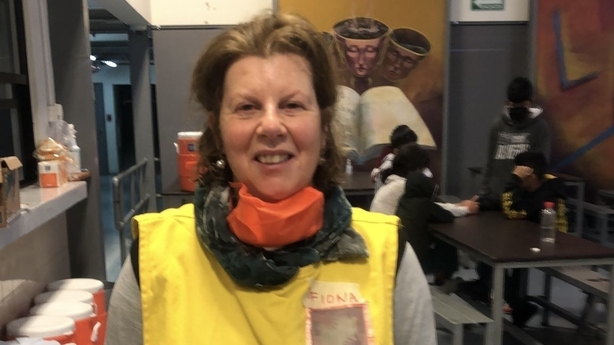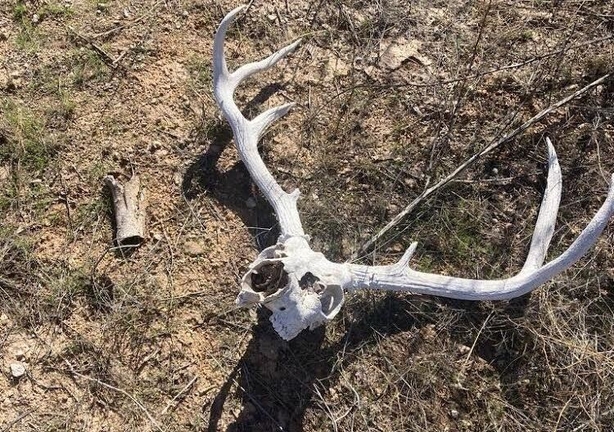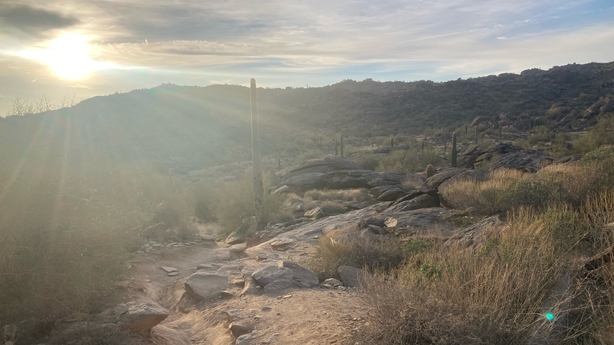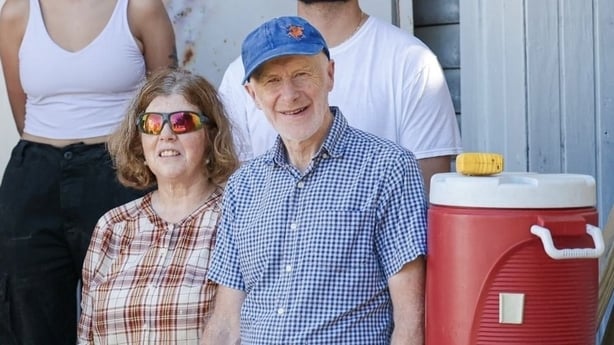"I didn't cry because I felt it was wrong to cry. It just made me determined to come back again."
For Fiona Burke volunteering at the US-Mexico border has been an eye-opening and heartbreaking experience.
Over the past five years, the 65-year-old, who lives in south Dublin, has spent many months on the front line of a major migration crisis which has seen a record surge of legal and illegal border crossings into the United States.
Most recently, part of that volunteering brought the retired Montessori teacher to the former Barry Goldwater bombing range in Arizona in January, searching the desert for people and precious documents.
"It’s quite a serious mission. We were given a talk to about how we had to respect all the rules, how we could expect to see bodies or remains… bones and perhaps people lost in the desert," she told RTÉ’s US election podcast States of Mind.
In the area in southwest Arizona, that was once used for military practice, the group was warned not to touch any missiles as they could still explode.
"We did find bones, we found skulls, we found human remains," she said.

Thousands of migrants risk their lives attempting to make the treacherous and dangerous journey from South America to the US every year.
While many are fleeing violence and political instability, most suffer horrendous trauma along the way – from violence to robbery and extreme temperatures.
In 2019, Fiona decided she wanted to do something.
Since then, she has been to Texas, Arizona and Mexico, mostly trying to help migrants get back on their feet after a gruelling journey to the US.
However, her time has brought her to the Mexican side of the border too.
Volunteering with a Jesuit-led charity in Nogales city, which has a heavy cartel presence, was an unbelievable experience, she said.
More than a third of all fentanyl getting to the US goes through the area.
"I stayed in student accommodation. I didn’t go out at night. We were advised not to go out at night... because I was on my own … my husband didn’t come with me this time," she said.
Working from a warehouse, which was a migrant shelter, Fiona helped dish out food, sorted out clothing donations and helped with children.
From the building, she could see the US border and hear the infamous La Bestia – a train, also known as the 'Death Train’, which sees migrants dangerously jump on board so they can travel to closer to the border.
While some people arrive in Nogales with the hope of crossing into the United States, many become stuck.
The city has turned into a limbo land for those struggling to cross a heavily fortified border, where they could be arrested and deported.
Nogales is also a place where you do not know who to trust, according to Fiona.

Porters at the entrance to the shelter screen those arriving to make sure they are not cartel members.
"Many people are on the run from the cartel not because they owe them drug money but simply because along with way the cartel have targeted them, kidnapped them and said we need money from you," she said.
"If you end up in the graveyard [in Nogales] where many people sleep, it’s really dangerous. You get beaten up and you get money extracted from you if you have any left," she said.
Immigration has become a top priority for Americans during this election cycle as research shows there are concerns about that the high levels are putting pressure on government and social services.
In December 2023, US Border Patrol had a quarter of a million encounters with migrants crossing into the US from Mexico.
In comparison – the monthly average from 2013 to 2019 was 39,000.

Fiona said she was "shocked" at seeing around 350 migrants arrive in Phoenix, Arizona every day last year.
For those who enter the US legally, whether through an official border post or by sponsorship, they join a long queue to be granted legal protection.
Recent measures by the Biden administration have stemmed the flow but in December 2023 there were 3.3 million cases pending before the courts.
In Austin in Texas, Fiona worked with a charity which takes people, legally, out of migrant detention centres, gives them access to legal advice and tries to set them up with jobs and accommodation.
Navigating trauma was a daily challenge and volunteers are advised not to question the people about their story or journey.

"If they come out with their story themselves, you listen. We are not encouraged to make them re-live it. We were encouraged to make them think… you are in Texas now and god helps those who helps themselves, so let’s get on with life. Of course we’ll support you with trauma but we’re not going to go there now unless it’s with a professional," she said.
However, stories did come out and she listened.
One man, in his mid 20s from Nicaragua, told her that he was badly beaten by police following a peaceful protest against conditions in the country and had severe nerve damage to his face and arm.
"He was about the same age as my son at the time. Two days [after he told me his story], I saw him and he was changed. They had looked after him… and already a landscape gardener in the area had engaged to work for him just using one arm… and that was amazing to see," she said.
"In Texas there was this spirit of, no matter how broken you are if you can work or do something, we will help you," she added.
The last four years have been inspiring for Fiona Burke, especially seeing the generosity of others shine through the charities she has worked for.
Her journey is not over yet. Her next stop is Guatemala.
"I’m not a practicing Catholic, but I come from that background and I really think it was God listening to me praying ‘send me somewhere where I can be useful’," she said.
Listen to the full interview with Fiona Burke on the latest episode of RTÉ's States of Mind, or download from wherever you get your podcasts






